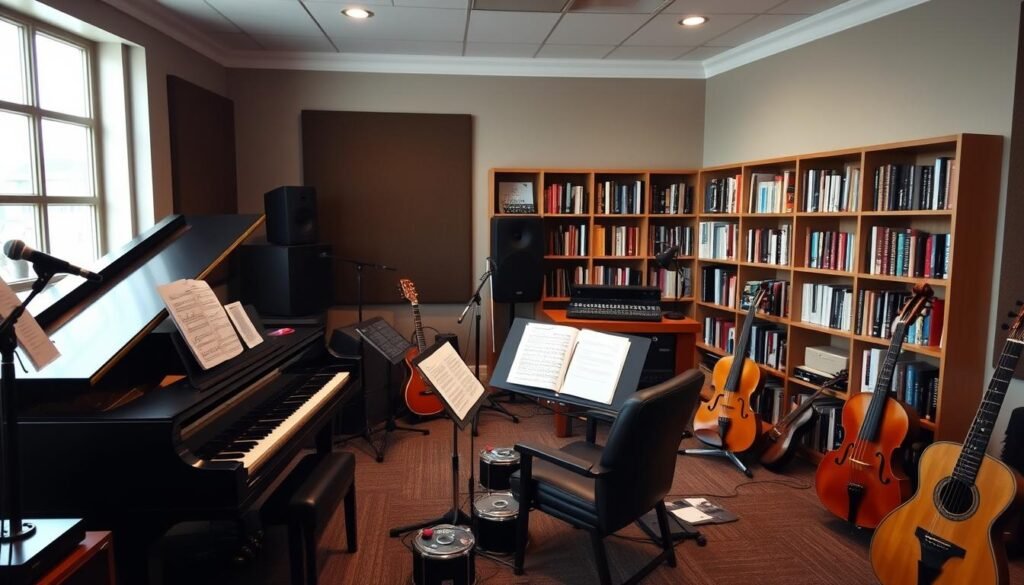Starting a music teaching career is a thrilling chance for music lovers to make a living doing what they enjoy. Music teachers help students learn to read notes, play instruments, and grasp music theory. It’s a fulfilling way to earn a salary while pursuing your passion.
Also Read: Top Music University Audition Tips For Success
Music teachers can find work in many places, like schools and colleges. In the U.S., the average music teacher makes $52,619 a year. Salaries can vary from $40,293 to $80,354.
Key Takeaways
- Music teaching offers a rewarding career path for those passionate about music education.
- Music teachers can work in diverse settings, from schools to private studios and online platforms.
- The average annual salary for music teachers in the U.S. is $52,619, with a range from $40,293 to $80,354.
- The job outlook for music teachers is positive, with expected growth of 4% through 2029.
- Acquiring the necessary education and certifications is crucial for becoming a successful music teacher.
Understanding the Role of a Music Teacher
Music teachers are key in shaping students’ musical education. They do more than teach music theory and performance. They create a positive learning space, keep track of student progress, and work with school leaders. They also encourage practice, help with performances, and keep up with new music education trends.
Also Read: Best Music Career Strategies For Beginners
Core Responsibilities and Duties
Music teachers have many important tasks. Here are some of them:
- Creating engaging music lessons for different students
- Tracking student progress and giving feedback
- Planning and running school music events
- Working with school staff for a unified music program
- Keeping detailed records of students’ work
- Staying updated with music education news
Required Musical Knowledge and Skills
Good music teachers know a lot about music. They can read music, sing, and play an instrument well. This knowledge helps them teach music theory, history, and appreciation. It prepares students for music careers or enriches their cultural understanding.
Also Read: Expert Tips For Writing Song Lyrics And Music
Different Teaching Environments
Music teachers work in many places. Here are some examples:
- Elementary schools
- Middle schools
- High schools
- Colleges and universities
- Music conservatories
- Private music studios
- Community music programs
Teachers in different places teach different things. They might focus on music basics or prepare students for music careers. Their teaching must match the needs of their students and the place they teach.
| Statistic | Value |
|---|---|
| Percentage of music teachers in public schools | 85% |
| Percentage of music teachers in private schools | 10% |
| Percentage of music teachers in other settings | 5% |
| Median annual wage for music teachers | $59,420 |
| Percentage of music teachers with a bachelor’s degree | 67% |
| Percentage of music teachers with a master’s degree | 22% |
| Projected growth rate for music teacher positions | 7% |
Educational Requirements and Certifications
To become a music teacher, you usually need a bachelor’s degree in music education. This degree covers music theory, history, and performance. It also teaches important teaching skills like classroom management and lesson planning.
Also Read: Vocal Training For Beginners: Your Complete Guide
After getting your degree, you must meet state certification requirements. These vary by state. In many places, you need a teaching certificate or license.
In Texas, for example, you must pass the Music EC-12 TExES certification exam. It has 100 questions and lasts 5 hours. You need a score of 240 to pass, and the exam costs $116.
In some states, you might need a master’s degree in education after a few years of teaching. This can improve your skills and pay. In Texas, a high school music teacher can make between $47,000 and $62,600 a year. Elementary or middle school music teachers can earn about $56,500 on average.
Music teachers must keep learning to stay up-to-date. They can take continuing education courses, join professional groups, and go to conferences. This helps them use the latest teaching methods.
Essential Skills for a Music Teaching Career

To start a successful music teaching career, you need a mix of musical talent, teaching skills, and administrative know-how. These skills make your teaching better and create a fun learning space for students.
Also Read: Best Music Marketing Strategies For Beginners
Musical Proficiency and Expertise
Being a music teacher means knowing music inside out. You need to be great at music theory, sight-reading, and playing or singing. You should show your musical talents and help students understand music well.
Teaching and Communication Abilities
Teaching music is more than just knowing music. You also need to be good at teaching and talking to people. This means creating fun lessons, using creative ways to teach, and giving helpful feedback. Being clear and direct is key to explaining tough music ideas and working well with students.
Business and Administrative Skills
Good music teachers also need to know how to run a business. This includes managing your time well, keeping student records straight, and dealing with money and logistics. Being organized and able to plan your time helps your teaching career run smoothly.
By having these skills, music teachers can become respected in their field. They give students a deep and rewarding music education.
| Skill | Importance |
|---|---|
| Musical Proficiency | Fundamental for effective music instruction and guidance |
| Teaching Abilities | Critical for creating engaging and impactful learning experiences |
| Communication Skills | Crucial for explaining musical concepts and providing feedback |
| Business and Administrative Skills | Essential for managing a successful music teaching practice |
Setting Up Your Teaching Practice

Starting a music teaching practice needs careful planning and smart decisions. First, decide where you’ll teach – at home, students’ homes, or a rented studio. If teaching at home, make sure your space is clean, professional, and quiet. This creates a welcoming place for learning.
Choose the right lesson books, teaching aids, and resources for your students. Think about getting colorful posters, music games, and other fun tools to make learning exciting. Also, have a well-kept instrument for lessons, as it greatly improves teaching quality.
Set up a clear pricing plan and policies, like how you’ll get paid and what happens if lessons are missed. Don’t underprice your work and be professional with scheduling and payments. Update your studio policy regularly to keep it in line with industry standards and clear for everyone involved.
Building an email list with tools like MailChimp is great for promoting your teaching. Use it to share student successes, make announcements, and build a community. Keep your website, bio, and teaching philosophy up-to-date to attract more students.
Use surveys to understand your students’ goals and learning needs. This helps you tailor lessons and keep students happy and engaged. A successful music teaching practice combines musical skill, teaching talent, and good business management.
| Aspect | Recommendation |
|---|---|
| Studio Policy | Revise annually and obtain signatures from all parties |
| Rate Increases | Raise rates every 2-3 years, with 90+ days written notice |
| Scheduling | Consider back-to-back lessons, 50-min with 10-min breaks, or pre-scheduling months in advance |
| Communication | Use platforms like Slack or private Facebook groups for effective parent and student communication |
| Email Marketing | Build an email list to promote student wins, make studio announcements, and establish studio culture |
By focusing on these key areas, you can build a successful music studio. Create a rewarding teaching space for your students. Also, make sure your lesson planning and studio management are top-notch.
Building and Growing Your Music Teaching Career

To grow your music lesson business, focus on crafting effective marketing strategies. Create visually appealing flyers using sound graphic design principles. Share them on social media, through personal networks, or by posting them in schools and community boards. Define your unique selling proposition to differentiate yourself from other music teachers in your area.
Develop a clear teaching philosophy that reflects your values, teaching style, and goals. This will help you communicate your approach effectively to potential students and their parents. Consider offering online music lessons to expand your reach to different locations and time zones. Building your reputation is crucial – provide exceptional value to your students and maintain a professional demeanor in all interactions.
Marketing Your Services
Utilize a variety of marketing strategies to promote your music lesson business. Create eye-catching flyers that showcase your expertise and teaching style. Leverage social media platforms to reach a wider audience and engage with potential students. Network with local schools, music stores, and community organizations to explore partnership opportunities.
Establishing Your Reputation
Provide exceptional service to your students, going above and beyond to ensure their progress and satisfaction. Maintain a professional and friendly attitude in all your interactions, from initial consultations to ongoing lessons. Encourage positive reviews and testimonials from satisfied clients, which can help build your reputation and attract new students.
Developing Your Teaching Philosophy
Craft a clear and compelling teaching philosophy that encapsulates your approach to music education. This should reflect your values, teaching style, and the unique benefits you offer to your students. Communicate your teaching philosophy effectively through your marketing materials, website, and interactions with prospective and current students.
Remember, building a successful music teaching career is an ongoing journey. By focusing on effective marketing strategies, establishing your reputation, and developing a strong teaching philosophy, you can set yourself up for long-term success in the music lesson business.
Also Read: Essential Tips For Effective Music Career Planning
Conclusion
A career in music teaching is both rewarding and demanding. It needs musical talent, teaching skills, and business savvy. Always keep learning and adapt to different students’ needs.
Focus on giving top-notch lessons, act professionally, and keep improving. This way, you can have a fulfilling career as a music teacher.
Stay patient, understanding, and passionate about teaching music. A lifelong learning attitude helps you keep up with music education changes. This ensures you give your students the best experience.
Start your music teaching career by staying current with trends and trying new teaching methods. Building strong bonds with students and the music community is key. With hard work, passion, and a drive for growth, you can positively impact aspiring musicians and enrich music education.
FAQs
Q: What qualifications do I need to start a career as a music teacher?
A: To begin a career as a music teacher, you typically need to obtain a bachelor’s in music or a related field. Additionally, completing a music teacher preparation program that includes student teaching is often required to become a certified music educator.
Q: What are the responsibilities of a music teacher?
A: The responsibilities of a music teacher can vary but generally include instructing students in different aspects of music, preparing lesson plans, conducting musical performances, and assessing student progress in music classes.
Q: What skills for music teachers are essential for success?
A: Essential skills for music teachers include strong communication abilities, proficiency in musical instruments or voice, patience, creativity, and a deep understanding of music theory and history. Additionally, organizational skills are important for managing classes and performances.
Q: What is the job description of a music educator?
A: The job description of a music educator typically involves teaching music theory, history, and practical skills, developing curricula, and fostering a positive learning environment for music students. They may also organize and conduct musical performances and collaborate with other educators.
Q: Are there specific music education programs I should consider?
A: Yes, when looking to start a career as a music teacher, consider enrolling in accredited music education programs that offer comprehensive training, including methods courses, music history, and opportunities for student teaching.
Q: Can I teach music without a formal degree?
A: While some music teachers may offer private lessons without a formal degree, most public school positions require a bachelor’s in music and completion of a music teacher preparation program to ensure you are a certified music educator.
Q: What types of music classes can I teach?
A: As a music teacher, you can teach a variety of classes including general music, choir, band, and specialized courses that focus on different aspects of music such as music theory and music history, depending on your expertise and the needs of the school.
Q: How can a music teacher help students achieve their goals?
A: A music teacher can help students achieve their goals by providing personalized instruction, encouraging practice and performance, and creating an engaging learning environment that fosters a love for music and develops their musical skills.
Q: What is the role of the National Association for Music Education in supporting music teachers?
A: The National Association for Music Education provides resources, advocacy, and professional development opportunities for music educators, helping them stay informed about best practices in teaching and the music industry.
Q: What are the benefits of pursuing a career as a music instructor?
A: Pursuing a career as a music instructor offers numerous benefits, including the opportunity to share your passion for music, inspire future music teachers, and engage with students in a creative and fulfilling environment. Additionally, it allows you to be part of the vibrant music community and contribute to the arts.
Source Links
- https://www.musicteachernotes.com/articles/how-to-start-teaching-private-music-lessons/
- https://www.northcentralcollege.edu/news/2021/08/31/how-become-music-teacher
- https://www.teacher.org/career/music-teacher/
- https://www.careerexplorer.com/careers/music-teacher/
- https://www.careersinmusic.com/music-teacher/
- https://www.teachersoftomorrow.org/blog/insights/how-to-become-a-music-teacher/
- https://www.teacherbuilder.com/blog/how-to-become-a-music-teacher-in-texas/
- https://www.alleducationschools.com/teaching-careers/music-teacher/
- https://nafme.org/blog/5-essential-skills-for-the-next-generation-of-music-teachers/
- https://www.zippia.com/music-teacher-jobs/skills/
- https://www.mtna.org/MTNA/Learn/Essential_Skills_Series/Essential_Skills_Part_4.aspx
- https://musictheoryshop.com/blogs/theory-questions/10-tip-checklist-to-set-up-your-music-teaching-studio-in-2023
- https://majoringinmusic.com/finding-first-music-teaching-job/
- https://www.matthelm.co.uk/starting-out-as-a-music-teacher/
- https://www.linkedin.com/pulse/music-business-mastery-how-make-six-figure-teaching-glory-bree-noble
- https://www.ashleydanyew.com/episodes/046
- https://doublebassblog.org/2007/09/you-can-teach-professionally-and.html
- https://www.cambridge.org/core/journals/british-journal-of-music-education/article/what-is-attractive-about-becoming-a-music-teacher-exploring-the-motivations-of-preservice-music-teachers-towards-the-profession/B0CDD6490251054C55257CC91FF05A27
- https://www.musicteachernotes.com/articles/




